Murdering South Asian leadership
The bloody saga of extending terrorist threats on our
heads of states
by Dhaneshi Yatawara
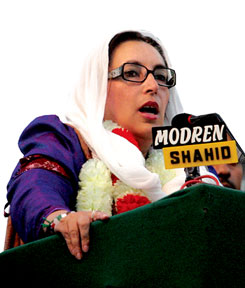 Friday the 28th December 2007: "We terminated the most precious
American asset which vowed to defeat (the) mujahadeen'," al-Qaeda
Commander and spokesman Mustafa Abu Al-Yazid has told the Italian news
agency Adnkronos International (AKI) in a phone call from an unknown
location claiming the responsibility over the assassination of Madam
Benazir Bhutto, Press Trust of India reported. Friday the 28th December 2007: "We terminated the most precious
American asset which vowed to defeat (the) mujahadeen'," al-Qaeda
Commander and spokesman Mustafa Abu Al-Yazid has told the Italian news
agency Adnkronos International (AKI) in a phone call from an unknown
location claiming the responsibility over the assassination of Madam
Benazir Bhutto, Press Trust of India reported.
On the fateful evening of Thursday the 27th of December 2007 Benazir
Bhutto, the 54-year-old former Pakistan Premier died after being shot by
a suicide attacker, who subsequently blew himself up near the venue of
her election rally in Rawalpindi in Pakistan. Her husband Asif Ali
Zardari and three children returned to Pakistan from Dubai late Thursday
night and accompanied her body in a special military aircraft from
Rawalpindi to her ancestral village in Sindh province.
Just hours before her assassination, Benazir has spoken to her three
children - Bakhtawar (19), Bilawal (17) and Asifa (14) - over the phone,
news reports flowing from Pakistan states.
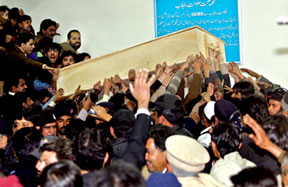 |
|
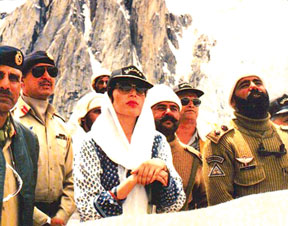
Prime Minister Benazir Bhutto inspects a Pakistani post in
Siachen Glacier with army officers |
|
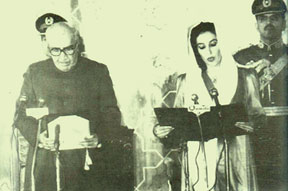
Benazir Bhutto sworn in as the Prime Minister of Pakistan in
1988 |
Madam Benazir Bhutto, the two-time Prime Minister of Pakistan ended
her life or was forced by terrorists to end her life attesting the de
facto threat from terrorism on the South Asian leadership.
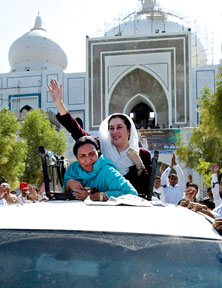 Currently, the Pakistan People's Party (PPP) finds it is difficult to
appoint a similar charismatic personality to replace Bhutto's position -
equally popular and influential. Currently, the Pakistan People's Party (PPP) finds it is difficult to
appoint a similar charismatic personality to replace Bhutto's position -
equally popular and influential.
Once in an interview with America's popular three hour national
morning show 'TODAY' on 22 October 2007 Bhutto said, "Look into the eyes
of the people who came to receive me at the airport, the joy, the
happiness, the singing, the dancing, before the terrorists struck," said
Bhutto. "They were celebrating my return because they want hope. If I
don't come back, the 160 million people of Pakistan won't have hope of a
future free from terrorism, a future that there will be democracy," when
the presenter questioned about Bhutto's return to her homeland despite
her fantastic opportunity to live in London safely with the children.
Former President John F. Kennedy, one of the most popular Presidents
of USA once said that "Men die, nations may rise and fall, but an idea
lives on".
During the signing ceremony of her Autobiography in Dubai May 2007
Benazir said, "My Father was arrested, released, rearrested and finally
hanged.
When I took my leave of him from the dark death cell in which the
tyrants had imprisoned him, I promised to keep alive his dream of a
democratic Pakistan. Since then I have never wavered in my commitment to
democracy."
She added, "The battle for democracy has not been an easy one. I lost
my two brothers who were both victims of political assassination. My
husband spent eleven and a half years of our married life behind prison
walls.
I was imprisoned for almost six years as was my Mother. We were
hunted, hounded and exposed to psychological warfare to break our
spirit. Our faith in God, the people of our country and the
righteousness of our cause sustained us through the bitter days and
nights.
I raised my children as a single parent coping with the demands of a
family, a political career and litigation. As a Mother, I suffered the
most when I had to leave my children when they were small. I had shifted
them to London and then Dubai while I continued to live in Pakistan for
a while."
Bhutto's actual encounters with maltreatments was soon after the
dismissal of her father's government in 1977 and his execution in 1979
as she intensified her criticisms of the then Government of General
Muhammad Zia-ul-Haq and attempts to organize a political movement
against him.
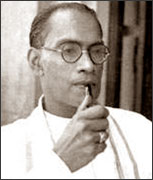 |
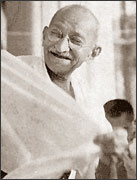 |
| S. W. R. D. Bandaranaike |
Mahatma Gandhi |
Repeatedly put under house arrest, she was finally imprisoned under
solitary confinement in a desert cell in Sindh province during the
summer of 1981.
"The summer heat turned my cell into an oven. My skin split and
peeled, coming off my hands in sheets. Boils erupted on my face. My
hair, which had always been thick, began to come out by the handful.
Insects crept into the cell like invading armies. Grasshoppers,
mosquitoes, stinging flies, bees and bugs came up through the cracks in
the floor and through the open bars from the courtyard. Big black ants,
cockroaches, seething clumps of little red ants and spiders. I tried
pulling the sheet over my head at night to hide from their bites,
pushing it back when it got too hot to breathe," Bhutto describes those
hellish settings in her autobiography "Daughter of Destiny".
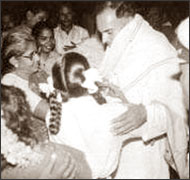 |
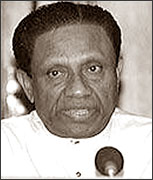 |
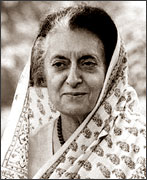 |
| Rajiv Gandhi |
Ranasinghe
Premadasa |
Indira Gandhi |
In 1984 she was finally allowed to travel to England to receive
treatment for a serious ear infection and she remained in exile there
until after Zia lifted Martial Law in December 1985. A huge crowd
numbering in the hundreds of thousands turned out on the streets to
greet her when she returned to Lahore in April 1986. Bhutto's stirring
oratory, familiar name, and striking appearance helped give her a strong
mass appeal.
During a speech she made at the Indiana University, USA in November
2004 Bhutto said that she had known both successes and setbacks but she
had never wavered from the commitment she made in the death cell with
her Father stating it is a commitment to fight for democracy and human
rights and that she would continue to do so.
Born into a wealthy landholding family with a tradition of political
activism in southeastern Sindh province of Pakistan, Bhutto enjoyed a
privileged childhood. Bhutto was born June 21, 1953, in Karachi,
Pakistan as the only daughter of former Pakistani Prime Minister
Zulfikar Ali Bhutto an inspiring political leader and Nusrat Bhutto
former Member of Parliament and Deputy Prime Minister of Pakistan.
She went on to study political science and philosophy at Radcliffe
College and Oxford University. She excelled academically and planned to
work with her father's government as a professional diplomat upon her
return to Pakistan in June 1977.
Only two weeks later, however, military officers led by General
Muhammad Zia-ul-Haq - capitalizing on public protests of disputed
parliamentary elections - overthrew Prime Minister Zulfikar Ali Bhutto
in a bloodless coup. Benazir Bhutto spent the next eighteen months in
and out of house arrest as she struggled to rally political support to
force Zia to drop fallacious murder charges against her father.
The military dictator ignored worldwide appeals for clemency and had
Zulfikar Bhutto hanged in April of 1979.
Bhutto led the PPP to victory in 1988 in the Pakistani elections,
country's free election held after eleven years, and Bhutto instantly
thrust in to political centre stage in the back drop of General Zia's
death in a mysterious airplane crash in August 1988. She swore into
office as the Prime Minister in December - the first female Premier in
any Islamic country on the globe.
In August 1990 after having been in office less than half of her
tenure, the then President Ghulam Ishaque Khan dismissed her government
unilaterally and called for fresh elections.
While ensuring that her Party was not returned to power, the then
President and the acting Prime Minister filed a series of references
against Benazir Bhutto and in addition her husband Asif Ali Zardari was
arrested and imprisoned for over two years on a number of trumped up
charges.
In July 1993, the President of Pakistan dismissed the Government of
Prime Minister Nawaz Sharif on corruption charges and called for fresh
elections.
The Pakistan Peoples Party went to the people in October, 1993 with a
new "Agenda for Change". Benazir Bhutto was again elected as the Prime
Minister after achieving strong popular support in all the four
provinces of Pakistan.
In 1998 during Prime Minister Nawas Sherif's regime, Bhutto leaves
Pakistan for exile on basis of political threats on herself and her
family.
"It was no secret to me that I could be attacked. I chose to return
and put my life on the line to defend a principle I believe in. I never
forced anyone to come out to the airport to receive me. They chose to
come because they wanted to bring change, to bring democracy and to save
their motherland from disintegrating," Bhutto stated further during
'TODAY'- the American morning show in October, commenting on her return
to Pakistan in 2007.
Ironically, in one of her speeches at the Political Parties
Conference held in Bangkok during November 22- 24 in 2002 Bhutto says,
"As an Asian leader in the twenty first century the greatest challenge I
see is to overcome terrorism. Asians need peace, freedom and free
markets to fight poverty, hunger, unemployment and conflict.
A brighter future is anchored in peace, in freedom, in equal
opportunity and in breaking the chains of fascism and dictatorship.
These were the values our forefathers fought for in confronting
colonialism.
There are the values that can sustain and strengthen us in this new
century," urging all Asian political parties to stand by the values of
peace, of freedom and of equal opportunity.
Madam Benazir Bhutto is not the first or the last to face such
tragedy in the path of protecting democracy and paying the price with
life for such great causes - and not of course the first in Rawalpindi.
Pakistan's first Prime Minister, Liaqat Ali Khan, was shot twice in the
chest while attending a public meeting in Rawalpindi on October 16, 1951
- just three years after Mahatma Gandhi was assassinated at a prayer
meeting in the very heart of the Indian capital.
The bloody saga of assassinations of leaders in our region starts
with those fatal shootings on Mahatma Gandhi by a lone killer named
Nathuram Godse, who shot him from close range at Birla House on the
morning of January 31, 1948 during a prayer meeting.
We Sri Lankans witnessed our first major political assassination when
a terrorist disguised as a Buddhist monk shot dead President S. W. R. D.
Bandaranaike on September 26, 1959 in Colombo.
In 1993, three decades later, Sri Lanka's 3rd Executive President
Ranasinghe Premadasa was killed when a Tamil Tiger suicide bomber
strapped with explosives blew up at a May Day rally held in Armour
Street in the Colombo city.
In 1994, Gamini Dissanayake the then opposition leader was killed in
a suicide attack triggered by the LTTE, during one of his campaign
rallies as a Presidential candidate.
In Bangladesh, country's founder leader Sheikh Mujibur Rahman and
most of his family were shot and killed on August 15, 1975 by a group of
irritated Army personnel. Bangladesh was found in 1971 after a bloody
struggle against the Pakistani military.
President Zia ur Rahman, who took power soon after Mujibur Rahman's
death, was also killed by army officers in the port town of Chittagong
on May 29, 1981.
Indira Gandhi - the 3rd and the 6th Prime Minister of India, was
assassinated by two of her many body guards namely Satwant Singh and
Beant Singh with machine guns on October 31, 1984 in the garden of the
Prime Minister's Residence at No. 1, Safdarjung Road in New Delhi. Both
the killers were Sikhs and Indira Gandhi, during that period was highly
critisized on the controversy over the killings took place in the Golden
Temple - Sikhism's holiest shrine. In September 1981, Jarnail Singh
Bhindranwale, a freedom fighter associated with a separatist Sikh
militant group took up positions within the precincts of the Golden
Temple and Gandhi ordered the Army, to enter the site with full military
force in an attempt to kill Bhindranwale despite the presence of
thousands of civilians in the Golden Temple complex at the time who were
paying pilgrimage to Guru Arjun Dev Ji's martyrdom anniversary. Many of
the pilgrims caught in the crossfire and were killed.
Rajiv Gandhi, the 7th Prime Minister of India and son of Indira and
Feroze Gandhi was killed by the LTTE suicide bomber Thenmuli Rajaratnam
also known as Gayatri and Dhanu on May 21, 1991, while campaigning for
the Sriperumbudur Lok Sabha Congress candidate in a village
approximately 30-miles from Chennai, Tamil Nadu.
South Asia continues to face this huge challenge of terrorism. The
massacres, assassinations, displacements of victimized people amplify
the prevailing social, economical problems with in the region. Necessity
of leaders with a vision and charisma, who can make a greater impact in
the international arena, is becoming intense.
Hence, the leaders of the region should have a vision and a mission
to combat terrorism or at least immobilize terror tactics in order to
let the future generation, the future leaders to breath freely in our
societies where terrorism and extremism has no say.
[email protected]
|
